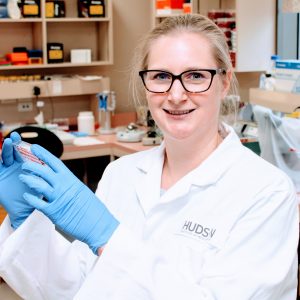Protein key to endometrial cancer spread identified
Scientists have uncovered a protein that could be responsible for endometrial cancer cells detaching from the womb and implanting elsewhere in the body – but a drug that is in development could help.

Endometrial cancer is the most commonly diagnosed gynaecological cancer in Australian women, yet there is no early diagnostic test and limited treatment options are available.
A team at Hudson Institute of Medical Research, including first author Dr Ellen Menkhorst and Professor Eva Dimitriadis, examined samples from women with the most common form of endometrial cancer and compared these with uterine samples from healthy women.
The team found that levels of the protein galectin-7 were elevated in the uterus in women with higher-grade endometrial cancers, which are metastatic.
The findings of the study have been published in the journal, Oncology Letters.
“For the cancer to spread, cancer cells must be released from the primary cancer site and travel to a secondary or metastatic site – like the seeds of a dandelion flower floating away on the wind,” Dr Menkhorst explains.
Endometrial cancer
Each year, there are almost 3000 new cases of endometrial cancer diagnosed in Australia and 466 women will die as a result of the disease.
Endometrial cancer mostly affects post-menopausal women, but rates in pre-menopausal women are rising.
Hysterectomy (removal of the uterus) is the most effective treatment option, but it’s highly invasive and the least preferred option for pre-menopausal women who wish to preserve their fertility.
“We believe that the protein galectin-7 may promote cancer growth. We found that increased galectin-7 levels in endometrial cancer could be responsible for cancer cells detaching from the womb and spreading to other areas in the body,” she said.
Galectin-7 has a number of different roles in the human body. It promotes the repair of the lining of the uterus after each menstrual cycle, but elevated levels of this protein are also associated with miscarriage and preeclampsia.
The protein can have pro- or anti- cancer properties, depending on the type of cancer, and has been investigated in other female cancers including ovarian, breast and cervical cancer. Until now, its role in endometrial cancer was unknown.
Drugs that could be used to block galectin-7 are already in development, and may be useful in treating endometrial cancer in the future, Dr Menkhorst said.
Contact us
Hudson Institute communications
t: + 61 3 8572 2697
e: communications@hudson.org.au



